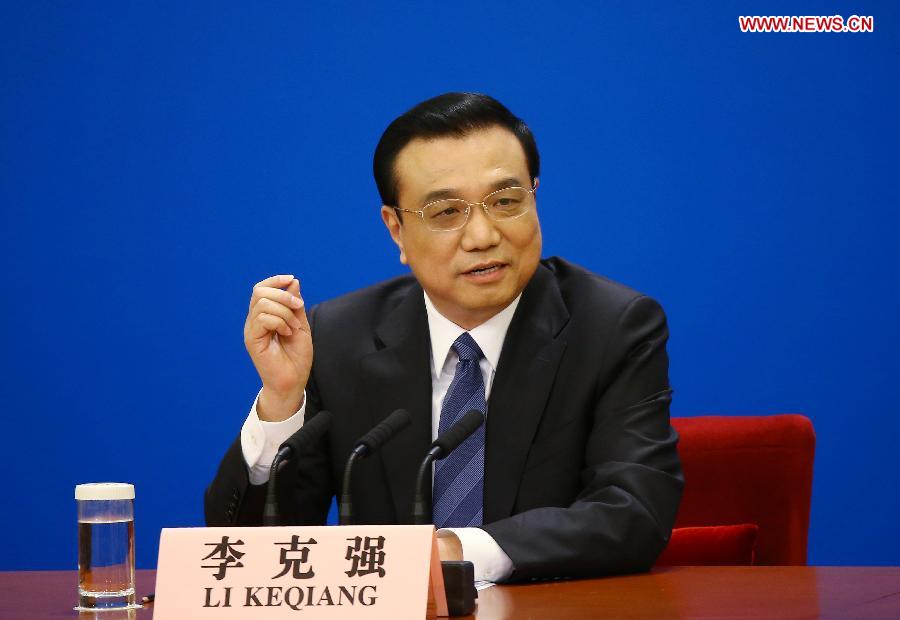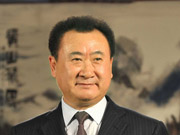 |
| Chinese Premier Li Keqiang speaks at a press conference after the closing meeting of the second annual session of China's 12th National People's Congress (NPC) at the Great Hall of the People in Beijing, capital of China, March 13, 2014. (Xinhua/Chen Jianli) |
BEIJING, March 13 -- Premier Li Keqiang said Thursday that the Chinese government will better handle the relationship between the government and the market, so as to add new impetus to the Chinese economy and boost the creativity and dynamism from all sides.
Last year, the Chinese central government took streamlining administration and delegating power to lower-level governments as the top priority on the reform agenda, Li told a press conference after the conclusion of the annual legislative session.
He said that the central government has abolished or delegated to lower-level governments 416 items previously subject to the review and approval of the State Council, or China's cabinet.
"This has sent out a very strong signal that we need to loosen strait-jacket over businesses and truly enable the market to play its role," Li said.
The number of newly registered businesses increased by 27.6 percent last year, among which newly registered privately-held businesses increased by 30 percent. This was the highest in over a decade, the premier revealed.
"This shows that streamlining administration and delegating power is a powerful tool in energizing the market and stimulating social creativity," he said.
It was decided at the third plenum of the 18th Central Committee of the Communist Party of China that the market will play a decisive role in allocating resources and government should play its role. "So streamlining administration and delegating power is a very important starting point," Li said.
He emphasized that the market economy is one based on the rule of law. "We need to ensure that market energies can do anything that is not prohibited by the law, and government departments must not do anything unless it is mandated by the law."
He also said that delegating power does not mean the government will stay out of everything, and that he hopes to combine both delegating power and tightened oversight.
"The government in this way will have extra energy to focus its attention on pursuing creative and better macro-control," he said.
Li said he is aware that in the course of delegating power, there have been such practices as midway obstruction or delegating power getting stuck in the last mile.
But he added: "How can an arrow shot be turned back? We're most determined to see the reform through."

 800-year-old ancient village in Shanxi
800-year-old ancient village in Shanxi A glimpse of China's Zhongshan station in Antarctica
A glimpse of China's Zhongshan station in Antarctica Female marines receive tactical training in NW China
Female marines receive tactical training in NW China Shanghai women fall in love with Aerial Yoga
Shanghai women fall in love with Aerial Yoga This is Beijing – Nanluoguxiang
This is Beijing – Nanluoguxiang Old photos of Anti-Japanese War (1937-1945)
Old photos of Anti-Japanese War (1937-1945) Top 10 cities for falling house prices in January
Top 10 cities for falling house prices in January Top 10 richest real estate tycoons: Hurun
Top 10 richest real estate tycoons: Hurun Large numbers of ancient coins excavated in Inner Mongolia
Large numbers of ancient coins excavated in Inner Mongolia British WWII veteran: I can't forgive Japan
British WWII veteran: I can't forgive Japan Top 10 brands that win rich women's hearts
Top 10 brands that win rich women's hearts Memorizing the Flying Tigers
Memorizing the Flying Tigers The Chinese Dream: the Chinese Spirit and the Chinese Way
The Chinese Dream: the Chinese Spirit and the Chinese Way
Day|Week|Month